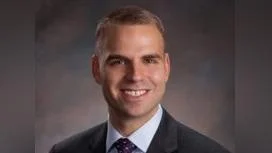Ryan McIntosh Nebraska State Director | NFIB Nebraska
Ryan McIntosh Nebraska State Director | NFIB Nebraska
The NFIB Small Business Optimism Index fell by 2.0 points in September to 98.8, marking its first decline in three months, according to the National Federation of Independent Business (NFIB). Despite the drop, the index remains above its 52-year average of 98. The Uncertainty Index increased by 7 points from August to reach 100, one of the highest readings in more than five decades.
“Optimism among small business owners decreased in September,” said NFIB Chief Economist Bill Dunkelberg. “While most owners evaluate their own business as currently healthy, they are having to manage rising inflationary pressures, slower sales expectations, and ongoing labor market challenges. Although uncertainty is high, small business owners remain resilient as they seek to better understand how policy changes will impact their operations.”
Ryan McIntosh, NFIB Nebraska State Director, highlighted hiring difficulties: “Finding qualified help remains a significant struggle for small businesses. Nebraska small business owners are experiencing this shortage, and it’s holding them back from expanding and investing in more communities.”
The report identified supply chain disruptions and inflation as key concerns for small businesses. The proportion of owners raising average selling prices increased by 3 points from August to a net 24% (seasonally adjusted), with a net 31% planning further price increases over the next three months. Fourteen percent of owners cited inflation as their main operating problem—an increase of three points from the previous month. Sixty-four percent reported supply chain disruptions affecting their business, up ten points from August.
Inventory levels also shifted: a net negative 7% of owners viewed current inventory stocks as “too low” in September, the largest monthly decline recorded by the survey. However, actual earnings changes improved by three points—the highest level since December 2021.
Expectations for better business conditions declined sharply, falling by 11 points to a net negative 23%. Labor quality remained a key issue; 18% of owners identified it as their most important problem, matching taxes at the top of the list.
NFIB’s monthly jobs report showed that a seasonally adjusted 32% of all small business owners had job openings they could not fill in September—the same rate as August. Among those hiring or trying to hire (58%), most (88%) reported few or no qualified applicants. Hiring plans rose slightly; a seasonally adjusted net 16% plan to create new jobs in the next three months.
Labor costs were reported as the most important problem for 11% of business owners (up three points), with a net 31% reporting compensation increases and a net 19% planning further increases.
Capital spending remained steady: 56% reported capital outlays over the last six months. Of these expenditures, most went toward new equipment (42%), vehicles (22%), or facility improvements (14%). Plans for future capital outlays remained historically weak at 21%.
Sales trends showed more firms reported declining sales than gains; a net negative 7% reported higher nominal sales over the past three months. Expectations for real sales volumes dropped four points to a net positive 8%.
Inventory investment plans were largely unchanged, with a net negative 3% reporting inventory gains and only a net positive 1% planning investment.
Price increases continued above the long-term average; unadjusted figures showed that one-third of owners raised average selling prices.
Profit trends improved slightly; among those reporting lower profits, reasons included weaker sales (33%), material costs (17%), price changes (10%), and labor costs (9%). Those reporting higher profits mostly credited sales volumes (58%).
Access to credit tightened: a net 7% reported greater difficulty obtaining loans compared to previous attempts—the highest rate this year—with borrowing costs rising.
Business health assessments remained stable: 11% rated their business health as excellent and 57% as good.
Only 11% of owners said it was a good time to expand their business—a relatively weak result.
Taxes were named as the most important problem by 18% of respondents; concerns about government regulations dropped slightly.
Other persistent issues included poor sales (10%), competition from large businesses (5%), insurance costs or availability (8%), and financing or interest rates (4%).
The NFIB Research Center has collected Small Business Economic Trends data through quarterly surveys since late 1973 and monthly surveys since 1986. Respondents are randomly selected from NFIB membership and results are released on the second Tuesday each month. The September survey was conducted during that month.





 Alerts Sign-up
Alerts Sign-up